Monthly Roundup #6: May 2023
post by Zvi · 2023-05-03T12:50:01.009Z · LW · GW · 12 commentsContents
Bad News
Good News, Everyone
Algorithms of Cultural Blandness
What If Most Philanthropy Was Hopelessly Corrupt?
Failure is Not an Option
The Age of Average
Sports Gambling On Phones is Dangerous
In Medical and Health News
Gamers Gonna Game Game Game Game Game
While I Cannot Condone This
That Will Be $8
While We Navigate a Banking Crisis
Work from the Start
None
12 comments
Bad News
Wild pigs continue to multiply and do increasing amounts of damage as they spread throughout America. Perhaps in the past we might have been willing to do what it would take to solve such problems. Today, we are not, and the situation gets steadily worse, and likely will continue to get worse.
What does this imply about our ability to handle other problems? If we can’t even get our act together to deal with a bunch of pigs, saying it’s an impossible thing to hope to deal with ‘within our lifetime’ what chance would we have against, say, a rouge AI loose on the internet? Or could one turn it around, since we are clearly more intelligent than pigs, yet failing to deal with them? One could say that we are proving ourselves to be not so smart, here.
I think that many people who expect humanity to be all right once AGI shows up are imagining it being a lot like how we are letting the wild pigs multiply. I’d urge people to think about whether that is a smart hope to have.
Imgur will be removing old and unused images not tied to an account, also all the porn. Old websites will continue steadily looking worse. I am very happy that my work has multiple backup copies.
Chile nationalizing its Lithium industry.
Patrick McKenzie tells us: Japanese credit card companies think it’s fine for their card to randomly not work for a week every so often?
Patrick McKenzie also illustrates how bad payment experiences can be, even without intentional sabotage. Luckily I have never seen it that bad, and I am guessing Japanese experiences get a lot worse a lot more often than American ones. I imagine how many customers you would love in the USA with such tactics and the answer is most of them.
Microsoft Windows update causes Windows to, for many uses, pull up the system settings menu when users click on a browser, if and only if both the browser is your default browser and its name is “Google Chrome.” This seems to have been in response to Google Chrome putting in a button to make Chrome your default browser.
Is there any argument that a retroactive huge pay raise across the board for public officials, in this case cops, isn’t corruption and the robbing of the public purse? The whole package seems engineered to pay everyone involved massively more money than the headline numbers while also granting benefits that cost a lot more than they are valued, all based on continuous gaming of the system that moves actual useful activity around in highly inefficient fashion. All the worst kinds of ways to structure relations of labor and management. Worst of all, hiding a lot of the pay doubtless makes it much more difficult to recruit good new cops. What can we do about this?
Biden administration flattens out fees charged on the origination of subsidized mortgages. Those with lower credit scores will still pay more than those with higher credit scores, but the gap will narrow.
Starting May 1, home buyers with a good credit score over 680 will pay ~$40 more each month on a $400K loan. Larger loans mean higher fees. A down payment of 20% pays the highest fees. Those payments will then be used to subsidize higher-risk borrowers through lower fees.
This is not as stupid as some people made it out to be, as higher credit scores still pay less than lower credit scores. It does mean a non-economic subsidy from low-risk buyers to high-risk buyers, which seems like a very bad way to engage in redistribution.
The predicted dollar treadmill is real, at least.
Khe Hy: A Harvard professor asked millionaires how much *more* money they’d need to be 10 on the happiness scale. Here’s how each group answered
$1 mm: Double
$2 mm: Double
$3 mm: Double
$5 mm: Double
$10 mm: Double
Folks, the hedonic treadmill is real.
Except, of course, they’re all so obviously wrong, unless they mean 10 out of 10 today. If you wanted to give me enough extra money to be happy today, then I would need a lot less than a 100% wealth bump.
If you are asking how much money makes me 10 out of 10 happy permanently? That’s not how money works. There is no such amount and this seems rather obvious. I’d love to double once or twice, don’t get me wrong, but that doesn’t actually solve any of my most important real problems.
If you gave me a hundred billion dollars, it wouldn’t make me 10/10 happy, because suddenly my days would be consumed with properly deploying a hundred billion dollars. That’s quite a big responsibility.
Utah blocks PornHub in response to new age verification law, saying that the law is so poorly constructed they have yet to find a better solution.
Good News, Everyone
Yes Yes Yes Yes Yes Please, huge if true.
Elon Musk: Rolling out next month, this platform will allow media publishers to charge users on a per article basis with one click.
This enables users who would not sign up for a monthly subscription to pay a higher per article price for when they want to read an occasional article.
Should be a major win-win for both media orgs & the public.
I would be absolutely thrilled to pay remarkably high rates for individual articles, if it wasn’t tied to a subscription. This is the correct economic solution, and lets people get their news from a wide variety of sources, which is best for everyone. Once I know you’re providing enough value, maybe I’ll even subscribe.
600 early stage projects you could support, via Sarah Constantin.
Fusion plants to be regulated as particle accelerators rather than in a similar way to fission plants. Industry reaction seems positive so presumably this is an improvement.
The Gambler Who Beat Roulette, via the obvious route of ‘solve the physics equation,’ the question is to what extent pocket computers were involved or did he purely ‘get good.’ I always find such stories fun, and will always warn that if you are smart enough and motivated enough to do such a thing, you’re smart enough and motivated enough to do many other things that pay more while producing actual value.
David Zipper reports in Slate:
Good news: Automakers are finally realizing that car touchscreens are a disaster. Drivers hate them, and they’re also dangerously distracting. Buttons and knobs are poised for a comeback.
Please, everyone, stop it with the touch screens and especially the total lack of actual buttons, and not only in cars. Buttons are awesome everywhere. They are doubly awesome in cars because of distraction risk. Button maxing for life.
NYPD can now shoot GPS trackers at your car. This seems like an excellent way to allow enforcement without escalating the risk of accident or violence.
It’s true, if you are good at breakups mostly they’re fine, and once you realize they’re going to happen you can both enjoy the time you have and also when you’re not enjoying that time, you can do them sooner rather than later.
Brooke Bowman: psa for dating people did you know that dating gets way less scary when you get better at breakups, this is a thing that’s possible to do you aren’t trapped nor are you guaranteed a toxic end to things
It takes two so some people might flip, yes, or act horrendously, but I’ve found that isn’t the majority for me If you try your best to be kind and communicative, keep people updated on where you’re at so there are no surprises, breakups don’t need to turn into fights
I didn’t really feel up to wading into that side of things with this thread but this is important also
Luna: …and when you realize that holding onto something that is over isn’t going to help or heal you… and that you really have no right to make someone stay with you… bc they are not your possession… it can also add some perspective… and take some pressure off…
Which also means you can enjoy your time with them more bc the ‘will they leave me’ insecurity can fade when you realize that breaking up isn’t the worst that can happen…sometimes loving someone means letting them find happiness somewhere else if they can’t be happy with you.
When I was dating, I was relatively unskilled in such matters, and still when things ended it mostly went fine.
The Art of the Comedy Show and not knowing when to quit.
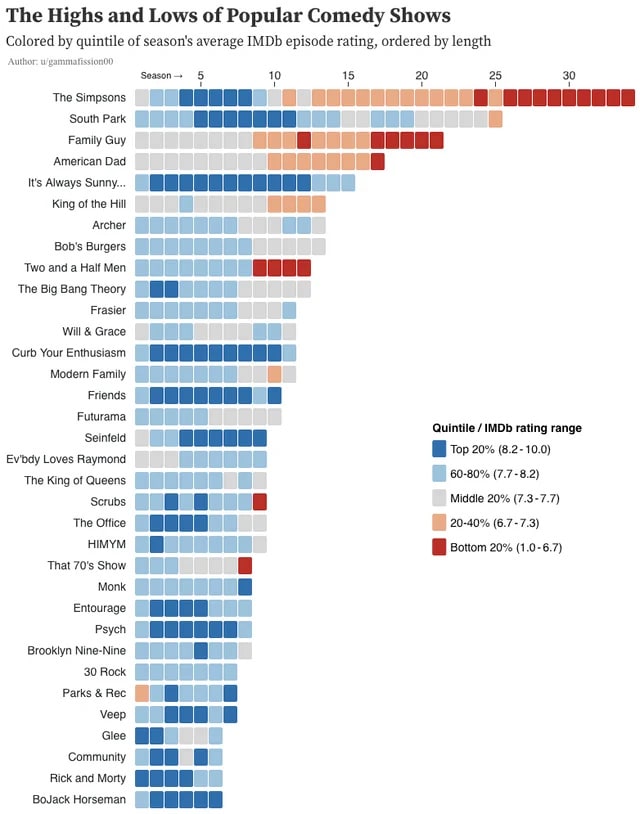
One bias in IMDb ratings is that people who are disappointed are more likely to bother to rate, and to rate harshly. I very much doubt that The Simpsons is being treated fairly here. In relative terms, yes, of course seasons 2-9 are the top, but from what I’ve seen of the later seasons the show is… fine? Do you know how bad the bottom 20% of shows really are?
There are two classes of costs to overstaying one’s welcome, and a third concern of ‘the talent starts getting outrageously expensive.’ First, you risk people watching the extra content when they shouldn’t, or it ruining people’s overall experience if you fail to finish strong. Second, you tie up the talent. I think both concerns are overrated. It is hard to get talent doing something as valuable as a running television show, and often when shows get bad it goes along with losing their top talent that you’d want to free up. If things get bad, then how much does that really ruin things, in the age of streaming and internet reviews where you can get episodes on-demand and look at charts like this?
Thus, I think it is correct to take a lot of risk of overstaying one’s welcome, from the viewpoint of consumer surplus, if the talent continues being affordable, so long as once it is clear that this has happened you wrap it up. Once you drop into the orange and red (and it isn’t first season foot-finding), you don’t recover. But, for example, I still got a bunch of value out of South Park and Futurama and That 70s Show well into the grey zone.
An argument that Josh Waitzkin is the most interesting man in the world, continuously mastering new crafts at the highest level. His book The Art of Learning was great, and he’s certainly a fascinating character. The most interesting question is, why choose to master Tai Chi, Ju Jitsu and surfing? What’s the plan?
Algorithms of Cultural Blandness
The Age of Average, everything everywhere is increasingly always looking the same, across architecture, interior design, cars, books, movies, video games and everything else. I buy the thesis, and that the new normal thing is often not only lacking in variety but pretty dreadful. The question is, what’s driving this?
The obvious answer and the one suggested by the post is ‘that’s what people actually want, that’s what wins in the marketplace, and now people know this’ works in some places, but not in others, and it seems like it should be self-limiting, because the more everything is the same, the more we reward that which is different, including in the market. There is lots of demand for the unique because it is unique, people respond positively to the quirky and personal, and as everyone else goes more identical you can score big by doing the opposite.
The weirdest one is architecture where (almost) everyone agrees the new normal is boring and hideous and anti-hideous and would have Christopher Alexander spinning in his grave, and I am very confident this is reflected in people’s choices on where to live and what houses or apartments to bid on. So something is overriding that – once again the efficient market hypothesis is false, although another suspect is regulation.
Video games and movies and books are much less confusing, there I understand why the market is doing this and it’s not obvious the market is meaningfully wrong. In particular I actually do want most game efforts to be iterative on existing stuff, I think that’s good.
There are a bunch of modern systems that I think are pushing funding, promotion, visibility, adaptation and so on towards this standardization, pushing people to fit into boxes, to ‘de-risk.’ You have massive machinery designed to efficiently deliver more of the same while putting up barriers to anything even a little different. Not an efficient market. But as I’ve noted before, if your funding things depends on others being willing to also fund and promote them, then you need an entire distinct ecosystem to break free of such problems.
Still does leave mysteries. Why are all the cars increasingly monochromatic, when there is large benefit to your car being a different color than other cars? That one I cannot figure out. There’s no way I would want a monochromatic car at this point. I’d presumably choose blue, but also choose a lot of other colors over no color at all.
Derek Thompson: A+ example of data-dulling, or the dark side of the Moneyballing of culture. The problem isn’t that Hollywood’s getting dumb. The problem is it’s getting too smart about the narrowest questions of consumer behavior, and it’s a threat to making actually-good-movies.
Deadline Magazinee (Zac Ntim): British filmmaker Dexter Fletcher is fresh off the release of his Apple TV+ crime caper Ghosted, and during a recent interview, Fletcher highlighted what he described as the “comprises” required when developing a project for a streamer.
“You can’t make a film for streaming the same way you do for theatrical,” Fletcher told Alex Zane’s A Trip to the Movies podcast. “There are different metrics and approaches. There has to be, for the very reason that people can turn off very quickly.”
The Rocketman filmmaker continued to say that he had initially planned a long and elaborate opening sequence for Ghosted that involved Ana De Armas driving a car through a mountain in reference to a scene from the 1978 film Foul Play, starring Goldie Hawn and Chevy Chase. Fletcher said he took the scene to Apple, who said they understood what he was attempting to create but raised concerns about whether it would resonate with a streaming audience.
“I thought it was great, this three-minute opening scene, and they said you can’t do it because if it [the opening sequence] goes on and something doesn’t happen in the first 30 seconds, we know the data shows that people will just turn off,” he said. “I don’t want that, so I make the compromise.”
I think the general phenomenon of Moneyball-style ruining media is real. In this particular case, it is less clear. The reason you can ‘get away with’ a three minute slow opening sequence in a theatrical movie, or even in a classic rental, is that you have already sold the movie to the viewer. The viewer has already made a time and money investment in the film. This gives you the rope to require more investment.
Streaming changes that equation. One could perhaps equate the first minute of a streaming movie to the movie’s trailer, except without all the spoilers. If there was a trailer where nothing happened for 30 seconds, let alone 3 minutes, that’s a really bad trailer. Having to ‘start off with a bang’ in this way to then earn your slow sequences later is annoying and imposes limitations, but so does having to give away half the movie to convince people to see it.
Sonny Bunch says Algorithms Didn’t Kill Hipsters; Poptimism Did. This post is an odd conflation of two different theories.
Theory one states that we should blame Poptimism, the idea that that which is popular is therefore good. A conflation we all know is not true. There are lots of things that are any combination of [good, bad] and [unpopular, popular], also things like [easy, difficult] or [cheap, expensive] and so on.
It is a conflation that is far more true in practice than people used to be willing to admit. It has its limits. Even only within one’s self, it is good to say ‘this thing is popular (as in, I like it) yet is not very good’ and also ‘this thing is unpopular (as in, I don’t like it) despite the fact that it is objectively great.’ There should be correlation, but only some.
The conflation has clearly shifted production away from high Quality (Persig-style) things and details, the objectively good, towards things and details that are and would be popular. Some of that was probably good at first. It’s definitely gone too far for total utility. I expect this to improve somewhat, as we adjust and as costs decrease due to AI, both justifying high-quality work and also flooding the market with low-quality work engineered for popularity. Incentives shift.
Then he shifts to a second distinct criticism. Here he says, have not merged into one metric, we have replaced the Quality axis with a new political axis – art gets rewarded and promoted to the extent it promotes left-wing things and correct left-wing actions and what the left-wing considers correct groups, and everyone’s job is to make art serve left-wing political ends. This, too, is doubtless doing damage to the Quality of art, as it is a rival optimization target competing for resources.
What If Most Philanthropy Was Hopelessly Corrupt?
If the entire altruism sector is hopelessly ineffectual and corrupt, is that an argument for or against Effective Altruism?
Tyler John: One thing I learned working in philanthropy is that it’s a whole *industry*: it’s people’s jobs to obscure cost-effectiveness and tell their billionaire advisees that they’re doing very important things that are above criticism — it’s in this context much EA backlash emerges.
I think EA is wholly underrated, especially by the left and various critics of billionaire philanthropy, as a way to create real, verifiable accountability among philanthropists who are deeply personally and financially invested in believing their methods are above reproach.
Do you really want to provide cover for the six figure head of philanthropy in the Princeton jacket at the billionaire foundation who says it’s impossible to compare interventions that alleviate extreme poverty to those that preserve rare cave fungi?
One possibility is that shining the light on things will greatly improve outcomes.
Another possibility is that the way to improve the world mostly does not go through institutional charity or altruism, such structures are going to be inevitably corrupted due to all the incentives involved, and we should assume that the same will happen or likely has already happened to major EA institutions. Under this theory, everyone involved should be doing a combination of smaller, individually verifiable operations where there is skin the game and incentives are good, and good old Effective Capitalism, instead.
I continue to think that the most effective charity, when available, is to take action regarding what you know best, where you know how to move things in good directions. Keep it Hayekian, keep it grounded, keep administrative aspects light.
Failure is Not an Option
Bucks fans got some very bad news this past month, a number one seed in the NBA playoffs falling 4-1 in the first round to the Heat. Star player Giannis was asked, for the second straight year by the same reporter, whether the season was a failure (video, 2:07).
NBA TV: “Michael Jordan played 15 years, won 6 championships. The other 9 years were a failure?” Giannis on the Bucks 2022-2023 season.
Giannis: “You asked me the same question last year, I think. Do you get a promotion every year? No, right? So, every year you work is a failure? Yes or no? No. Every year you work, you work toward something – to a goal – which is to get a promotion, to be able to take care of your family, to be able to provide a house for them or take care of your parents. You work toward a goal. It’s not a failure. It’s steps to success,” he said.
“Michael Jordan played 15 years. Won six championships. The other nine years was a failure? … Exactly, so why you ask me that question. It’s the wrong question.
“There’s no failure in sports. There’s good days, bad days, some days you are able to be successful, some days you are not, some days it is your turn, some days it’s not. That’s what sports is about. You don’t always win. Some other group is gonna win and this year someone else is gonna win. Simple as that. We’re gonna come back next year and try to be better, try to build good habits, try to play better.
“So, 50 years from 1971 to 2021 we didn’t win a championship, it was 50 years of failure? No it was not. There were steps to it. And we were able to win one and hopefully we can win another one.”
A lot of people I know, especially old Magic: the Gathering players and competitors, loved to see it. Even compared it to Ted Lasso. The journey is its own reward and all that. Also helps keep the motivation up, every attempt is part of your journey, got to keep a positive attitude.
Andrew Rettek: Damn, that’s a great answer. Really admire his ability and willingness to avoid being mean or angry while being that obviously frustrated with the press.
My reaction was a bit different.
On the one hand, sir, in addition to being a great player, I greatly admire your tenacity, your hard work year in and year out, your struggle to be the best. This attitude, presumably, is working for you, as you’ve turned in star performance year in and year out. Whether or not that turns into a championship is never fully under one person’s control.
I also love the down-to-Earth, positive world vision of why a reporter would strive year after year – to provide for their family and give them a better life. Also great media handling. Great answer.
On the other hand? It’s also at least kind of complete and utter bullshit.
Michael Jordan played 15 years. He won 6 championships. The other nine were a failure?
Yes.
At least, in the years he had championship-level talent around him, and also his attempt to play professional baseball.
He was Michael Jordan. He failed, in those other years, to win a championship. That is what failure means. Not only is there failure in sports, there is, in an important sense, mostly failure in sports.
Taken as a whole, Michael Jordan is of course a huge success, one of the best of all time. Even the best careers are full of failure, even when they aren’t attempting a second career in baseball.
That doesn’t mean that ‘second place is the first loser’ always applies. Success is not only absolute, it is also relative to expectations and conditions, and what is realistic in a given moment. Second place is, by default, very much a ‘congratulations and condolences’ situation, a successful failure, yet a failure nonetheless.
As a Mets fan, if we had lost last year to the Dodgers in the NLCS after winning the NL East, would that have been failure or success? A mix of both. Losing in the World Series? One might call that a ‘successful failure.’
Losing to the Padres in the wild card round after losing the division to the Braves?
Failure!
A worthy journey worth taking. I’m glad I went on it with them. Still a failure!
College sports, where I root for Wisconsin, makes this even more clear. Consider last year in football. Absolute failure. How can you pretend that it wasn’t. Suppose we had made it to the Big 10 championship game and gotten blown out by Ohio State. Would that have been failure? Well, sure, in one sense. In the central sense, no. That would have been what the team could realistically hope for, and I’d be happy.
An experience I’ll always remember is explicitly setting my goal of making the Top 8 (Quarterfinals) of a Pro Tour because after that anyone can lose any one match, getting there and then promptly getting blown out in a haze. I realized my mistake. The next time, I said for the first time ever, ‘let’s go win a Pro Tour’ as I stepped into the hall for thee first round. That’s the only one I won.
When Michael Jordan was trying to make it in baseball, did he primarily succeed or fail? That depends on the goal. One can say that hitting .202 in the minors at age 31 was highly disappointing. One could also say that it was super impressive in context, baseball is incredibly hard, the goal was to give it 100% and do everything the right way and he did that. One can see that either way. I centrally say failure.
By these principles, it seems very clear that the Bucks season was a failure. They were a number one seed. They had championship-level talent. They lost in the first round.
Don’t give me excuses. Good job, good effort. You still failed.
If you think you succeeded, you are not aiming high enough.
Win or go home. You lost. Go home. Keep practicing. Wait till next year. Let’s go.
The Age of Average
Sports Gambling On Phones is Dangerous
Eric Spitzangel writes in The Free Press about problem sports gambling. We see more stories like this these days. Sports betting is increasingly legal, increasingly available on your phone, increasingly pushed to everyone as they watch sports or go about their day. For most people who gamble, this is fine. I continue to think that the median person who gambles on sports does so responsibly, and gets their money’s worth in entertainment.
The problem is that about 1% of people who try sports betting end up with a serious gambling problem. For many of that 1%, they will gamble until they and their family have nothing left, ruining their lives.
As a comparison, roughly about 8.5% of people who try alcohol develop alcohol use disorder, 95% of them get negative consequences, 25% get ‘serious’ consequences on the level of job loss or divorce (so about 2% overall), and 10% of those with AUD (or ~1% overall) get life threatening consequences, despite all our efforts to prevent this.
What can we do? Prohibition for sports betting is not on the table at this point.
The obvious intervention is that we can maximize how much people are allowed to lose, as a percentage of their wealth or income. And when someone hits or approaches that limit, we can take action to ensure they have every opportunity to seek help.
The way this would work is, all legal sportsbooks and other casinos (and ideally we’d let illegal bookies participate too) send customer net profit numbers to the IRS on a continuous basis. The IRS uses this in two ways.
One, it sends winners the correct information for their taxes, and ensures everyone pays on their winnings, while also ensuring everyone can net their losses against their gains.
Two, when a customer lost too much money in too short a time, compared to their current and historic income, the system would flag it, and the sportsbooks would be told to limit the customers’ wager sizes going forward and cut them off from all promotions and bonuses, and they would be sent a warning and information about resources to get help. This could perhaps go in two stages – if things go badly you’d get backed off somewhat and the sites would need to lay off the marketing, if things go badly enough you clearly have a problem then that’s that. And the sites themselves would then have good reason to try and keep their customers from triggering those thresholds. You’d ideally have limited exceptions for showing wealth instead of income or declaring yourself a professional gambler, similar to the qualified investor.
It also makes sense to allow spouses to invoke these limits on each other. If your husband or wife says no more gambling for size, then no more gambling for size. It is their life and money too. You can undo that by divorcing them, if you must, then lose all the money, which seems better than divorcing after you lose all the money.
Thus, most people would be able to gamble on their phones when they wanted, while knowing that if their gambling got out of control, they would lose access to legal gambling, and be warned to get help.
Could such addicts then go to illegal bookies and casinos? Yes, but the additional frictions and risks involved would provide a lot of protection. Also, I would make it a very minor criminal act to book a wager under normal circumstances, and make it a much more serious one to book for a problem gambler banned from the legal websites (which can be verified from the customers’ phone). Make it easy to do the right thing.
In Medical and Health News
A new $5 billion for ‘Operation Next Gen’ to follow up Operation Warp Speed. Underfunded, too late, still excellent, I had zero expectations on this front. The best part of this is the potential for future iterations of this model.
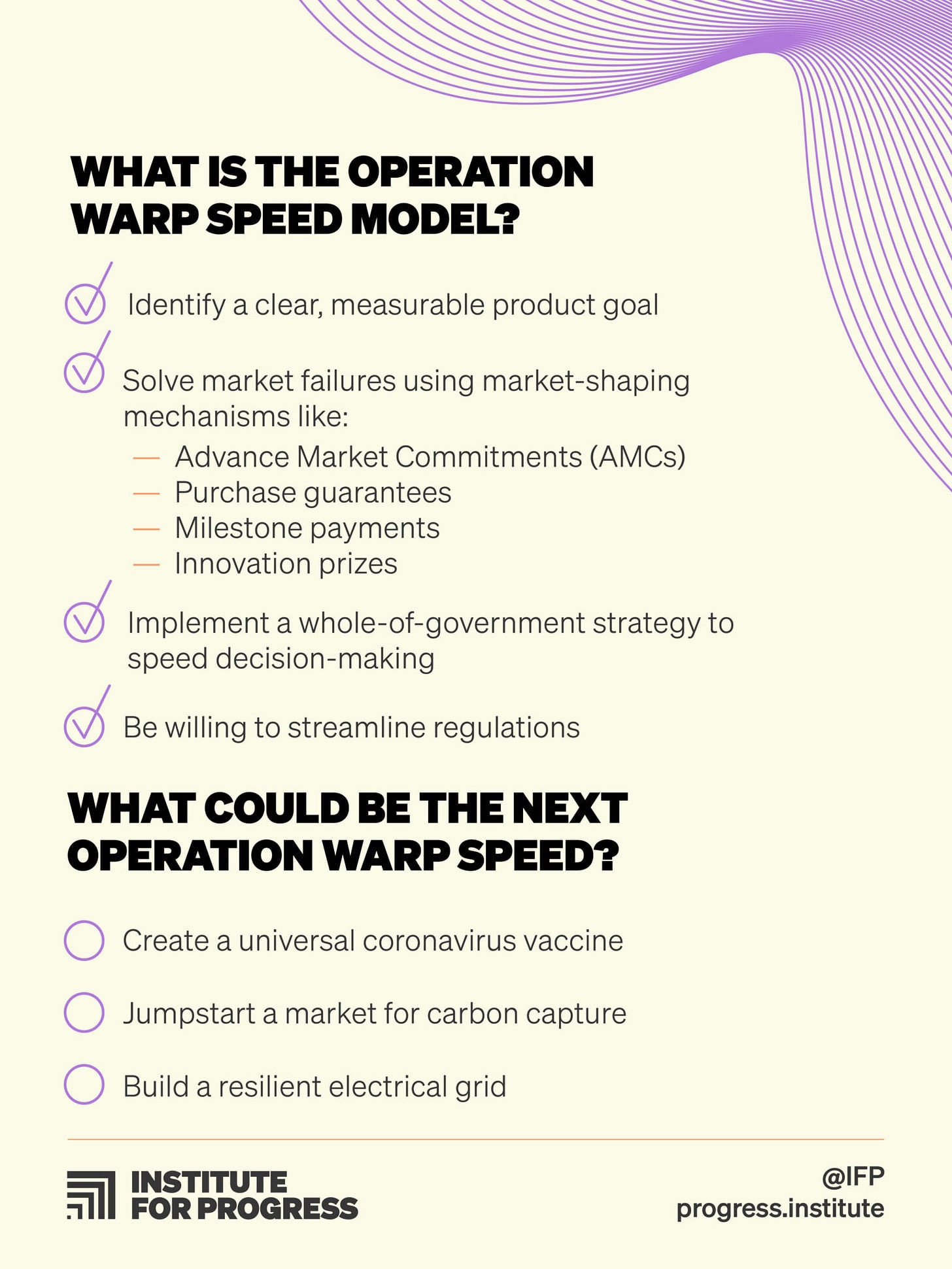
Thread claiming many recent advances in gene-editing. I don’t know how impactful to expect these to be, or how close we are to such technologies having mundane utility. This could potentially offer a way to slow human aging?
Potentially intriguing specific way to slow aging? Paper: Ageing-associated changes in transcriptional elongation influence longevity.
Genetic variants in RNA polymerase II that reduced its speed in worms5 and flies6 increased their lifespan. Similarly, reducing the speed of RNA polymerase II by overexpressing histone components, to counter age-associated changes in nucleosome positioning, also extended lifespan in flies and the division potential of human cells. Our findings uncover fundamental molecular mechanisms underlying animal ageing and lifespan-extending interventions, and point to possible preventive measures.
A less exciting alternative that I hesitate to mention it, but it seems that male castration does have substantial longevity benefits in humans? Don’t do this, obviously, but the effect here is substantial.
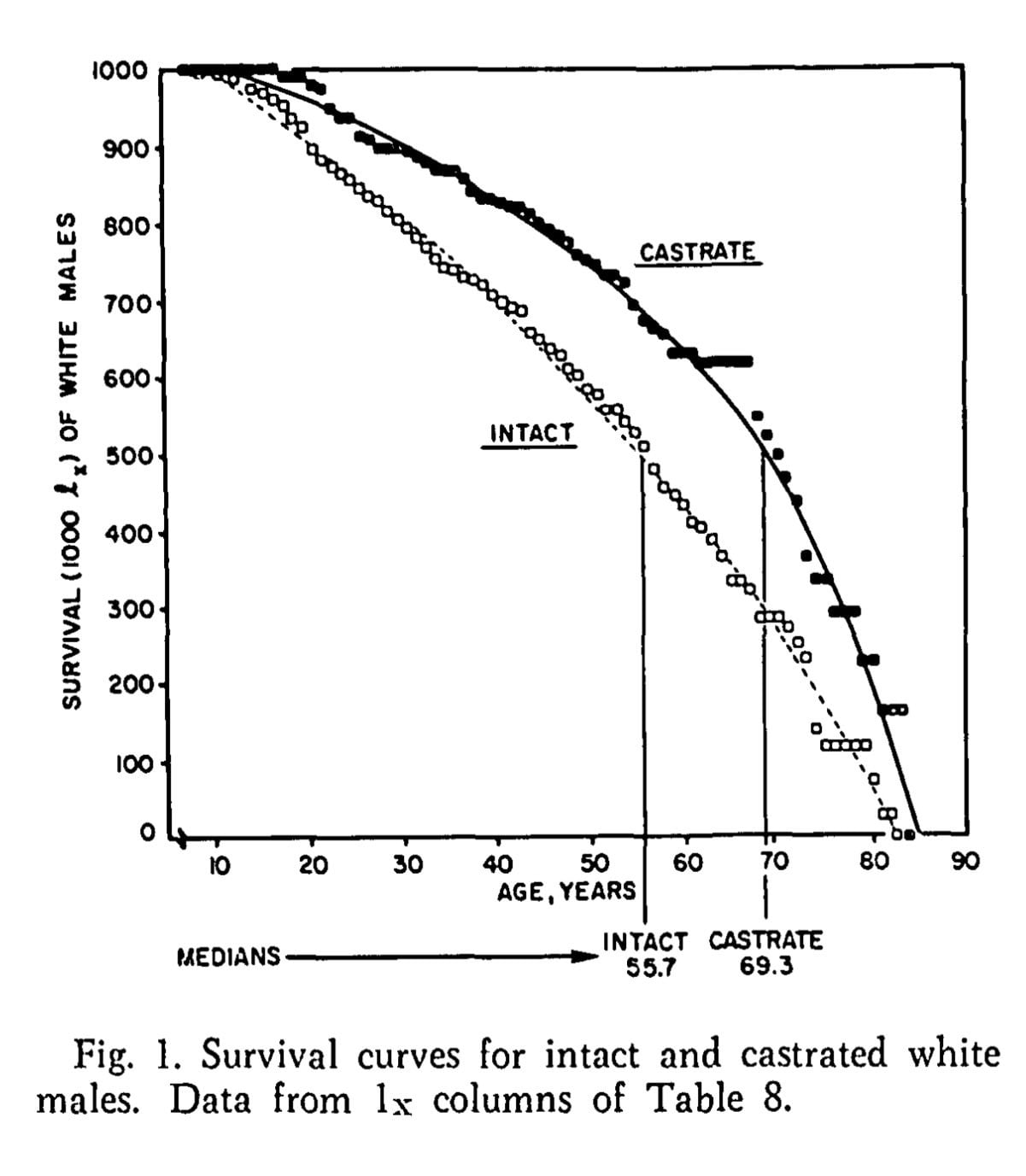
It’s very much for the best that there is no impact here on maximum longevity, and that the mental illness in the groups in the study likely greatly increased the effect size. So once again this result won’t hold, don’t do anything epically stupid here. Still, it raises the question – if there really was a 24% lifespan increase, and it included impact on maximum lifespan, then what? And what if it was the opposite, you started out castrated (with some sperm donations in the bank, let’s say) and had the option to un-castrate yourself in exchange for 20% of your lifespan? I notice there’s a lot of status quo bias here that I expect is pretty universal.
It seems there is a thing called ‘exercise non-responders’ who have very low returns to exercise, both in terms of burning off calories and in terms of building muscle. I’ve been moving more and more towards ‘people’s bodies and minds react surprisingly differently to food consumption and various forms of exercise, there are no universal solutions, other than that if you want to weigh less you should eat less and if you want to weigh more you should eat more, and if brute force does not solve your problem you are not using enough, whether or not it would be worthwhile to use enough.’ My solution was essentially to use enough, in the form of cutting caloric consumption, permanently.
New research paper says letting nurse practitioners operate without oversight from physicians does not reduce patient safety. AMA, a cartel association of doctors, somehow still opposes this, can’t imagine why.
US Government continues to fund unsafe research on pathogens in ways that make absolutely no sense. I agree that this is indeed a strong reason to worry about giving the government any authority over AI, but it also is an argument that we can’t simply leave such forces to their own devices. What are the good options?
I know what they’re thinking and still can’t quite fully believe this is a real thing.
BC Children’s Hospital: Not feeling great? Your appointment can wait. If you or your child are coming to one of our clinics but are feeling sick, please call & rebook your appointment for when you are well. Thanks for helping keep our patients and staff safe & healthy.

I am off the Covid beat and especially off the Covid accountability beat, but Paul Graham linked to this post about who did and did not try to get schools open ‘purely for the community notes’ and he’s not wrong.
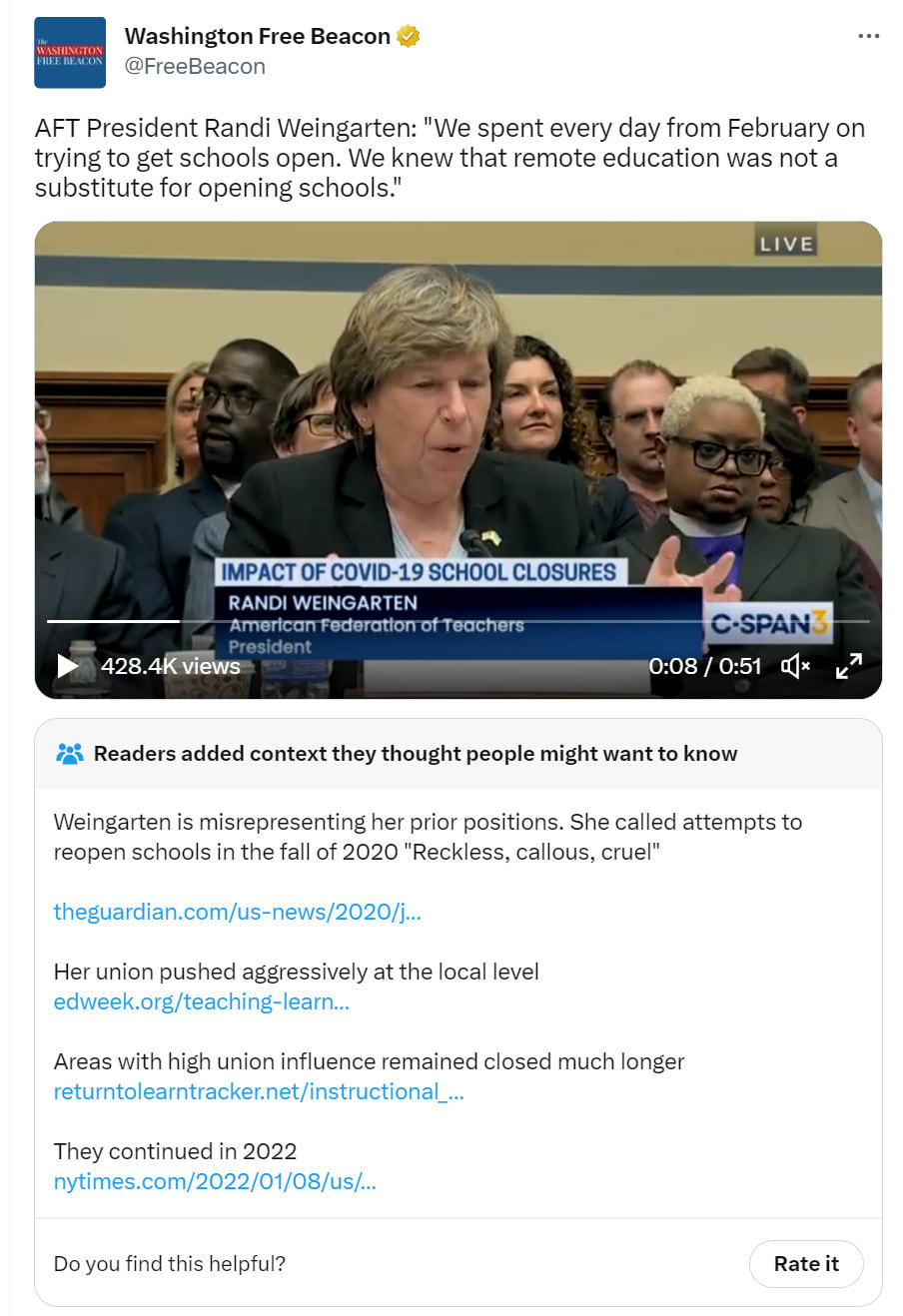
Gamers Gonna Game Game Game Game Game
Alas, the Emergents TCG is no more and Interpop the company is winding down. The game has shut down and can no longer be played. I am incredibly proud of the entire team and the game we put together. I think the core gameplay was really great. I am deeply sad that we did not have the opportunity to finish the rest of our vision, and get that vision in front of players – our outer loops, the ‘things to do’ in the game, and many other features were never fully active.
Grum offers his speculations on what happened to the Emergents TCG. At least one of his observations is wrong, but this is clearly a good-faith attempt to guess at what might have happened.
Some day, no doubt, I will tell the story of what happened. Today is not that day.
Storybook Brawl is also no more, having shut down its servers on May 1. This was a great game, and I am deeply sad that it could not even keep its servers running.
An excellent compilation of board game recommendations. All the ones I know about are great picks, his explanations spot on.
Sam Black super highly recommends the new Richard Garfield game Mind Bug. A slam-dunk purchase decision, great core mechanical ideas, how could this not be great.
While I Cannot Condone This
Hindenburg Research sets its sights on Icahn Enterprises, claiming an inflated NAV, an unjustified huge premium to NAV, and the whole thing being essentially a Ponzi scheme, doing at-the-market offerings to pay huge dividends (>50% of true NAV per year!) while Icahn takes his own dividends in stock.
File under Those New Service Sector Jobs? Hey, if you’re Chinese woman and you’re paying thousands of dollars to romance a male video game character, well I wouldn’t advice that, but if you are already doing that and for something like $20/hour you can get a skilled cosplayer who is detail-oriented to go on an in-character date with you, that seems like a huge upgrade.
Here’s how deep the rabbit hole goes.
At one point, Ren was even considering offering the cosplayer a large sum of money to stop going on dates with other dream girls as Zuo Ran. She knew from social media that many other dream girls have done this.
“Luckily, one of my friends stopped me from doing so,” said Ren. “She reminded me that my love for the cosplayer was illusionary and fleeting, and that I should spend the money in the game to support the real Zuo Ran, who will not change his mind about me.”
The scariest part? The interactions in these games are purely scripted. This is what is happening without AI.
Graphs of use of words over time seem to show that Great Awokening was a global phenomenon, it didn’t first happen in the United States.
Advice from Tyler Cowen that if you are worried about a cataclysm, you should stay put in your American city, because it is likely to get aid. Even if it’s Washington and the fear is nuclear war, because who would dare target Washington unless there would be nowhere else left to go? Whereas if you flee to New Zealand, they won’t take kindly to you in a crisis, says this theory. This all seems super wrong to me. It is a gamble on things ‘being normal,’ there being a center that holds and provides aid, that can restore food service and other basic needs before everything collapses, of there being a social order you can fall back upon that will mostly hold up, of everyone not simply being killed. Is there a particular kind of crisis where that makes sense? Yes, but it seems rather narrow. If anything, this seems like an argument to get to your destination early if you think things are about to go down, to prepare in advance.
Patrick McKenzie resists the urge to Kool-Aid man into a conversation about a hotel deposit refund failing to appear on a debit card, yet I really wish he’d done it. Here’s what he would have said.
Chinese industrial policy in 2008 starts subsidizing local firms with lots of patents. Goodhart’s Law does what it does, firms buy patents and get lots of new low-quality patents, innovation decreases, effects negative even before things like corruption.
Introducing Blur crypto lending, the hot new ways to lose your money on NFTs. You have two exciting options. You can buy NFTs on margin using Blur, borrowing the bulk of the cost, then lose whatever you invested while sticking Blur with the larger bill. Or you can be Blur, and loan out the bulk of the value of NFTs with highly illiquid and volatile markets, because that business model won’t inevitably blow up, no sir.
An overview of the barriers to improving American air travel. We no longer regulate prices and destinations, we still highly regulate everything else and we are getting what we would expect from that. Simple things like letting foreign airlines participate and auctioning off runway slots at airports and getting rid of the insane 1,500 hours-of-flight-experience pilot licensing requirement would be big improvements.
Russian government suspends data publication on oil, gas and condensate production. The more sensitive the Russian government would be about publishing bad news, the less bad this news is – if you think they’d pull the data on even a small drop then we learn little from this, if you think they wouldn’t do that then this is a big deal.
That Will Be $8
I continue to be strongly with Taleb on this.
I can’t get people who pay thousands, sometimes tens of thousands of dollars for their car lease, country club fees, (rarely used) gym membership, etc. and, while spending a lot of time on TWITTER, refuse to shell out $8 for the service.
Despicable, domain dependent misers!
Or, rather, I get it, and think they’re being stupid. The supposed anti-blue-check backlash isn’t real, and to the extent it is, good riddance. As for ‘supporting Elon’:
Emo: Misers or people who don’t want to support the baby man child owner?
Taleb: IMBECILE, why do they stay on Twitter?
Taleb (reply to original): I paid because I don’t like to freeload or owe anything to anyone. The argument is even more potent if you don’t like the owner.
The last one is prime Taleb, I think it is less clear yet more true than false.
The only reasonable argument against this I’ve seen was from Matthew Yglesias, who says he actively does not want the extra engagement and doesn’t like the other features. I can buy that the blue check mark is worth a lot less than negative eight dollars to some people, on practical grounds. I can’t buy the argument it is worth too close to $0.
While We Navigate a Banking Crisis
Gary Gorton takes the bold stance that (1) non-transactional bank deposits should not be insured, depositors should be responsible for keeping their money safe and also (2) that a bank’s asset portfolio should be hidden from everyone but bank examiners, so that no one knows if the bank is solvent. Also as a bonus he has (3) ‘No. I don’t think moral hazard problems exist…. I’ve done academic work on this and I can’t find any evidence of such moral hazard.’
I do not understand what the point is of not insuring deposits if you don’t allow depositors to monitor the financial health of the bank.
At least as of early April, Europe was continuing to boom despite its negative trade shock.
The news this past weekend was the fall of First Republic Bank, which was sold to JP Morgan Chase. First Republic provided excellent service. I am sad to see it go. I don’t have any sympathy for them, because they gave out lots obviously unprofitable long duration low interest loans, and it killed them. As someone who took out a loan of that type from a different bank, this isn’t hindsight, I was signing the papers wondering how in hell the bank decided the trade was a good idea.
What happens next? Jamie Dimon says this phase of the banking crisis is over. Yet regional bank stocks are suffering. This is not so inconsistent. I don’t see much reason to worry about keeping one’s money at a regional bank. It is obvious such deposits will be protected, whether or not this is formalized. I don’t like that we have an important unformalized policy like this, but at this point, shrug? Whereas it is clear shareholders are not going to be getting much sympathy, so yes shares are now worth less.
Work from the Start
A very interesting speculation.
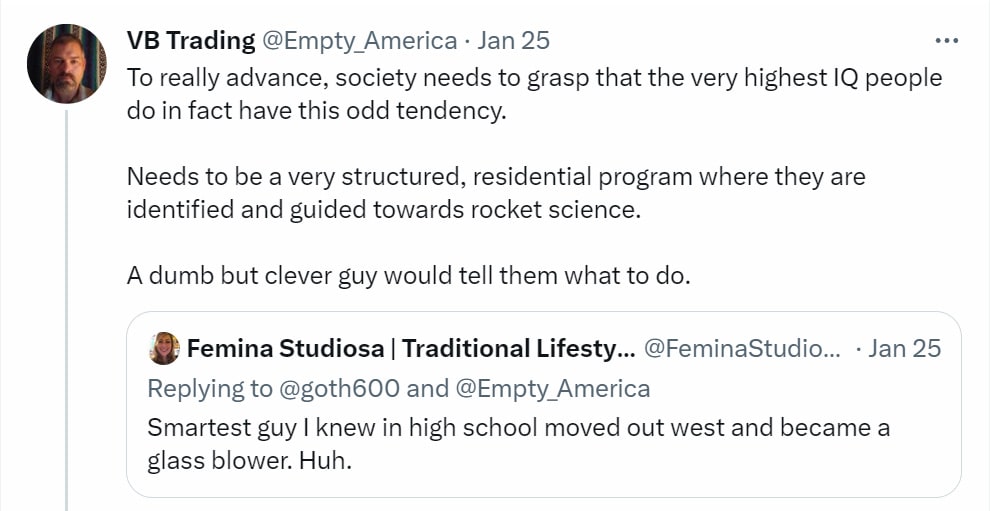

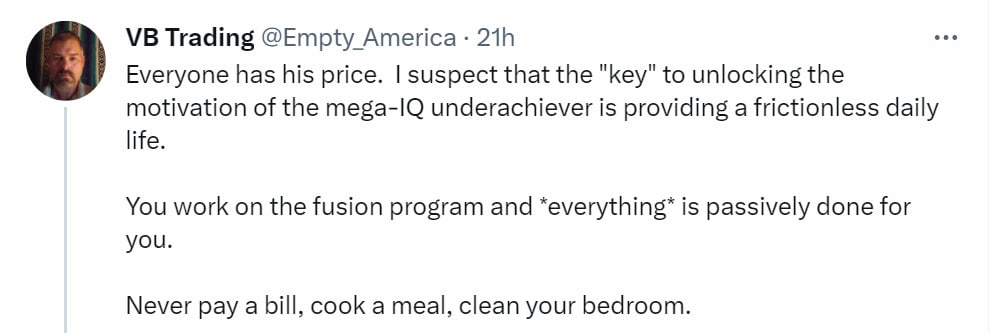
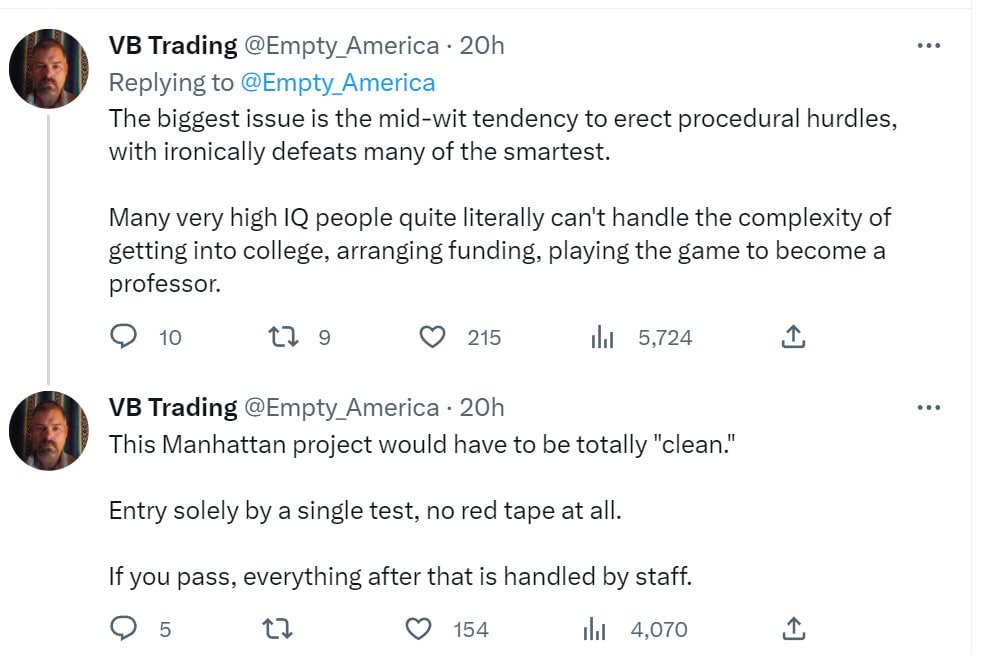

And the rejoinder.
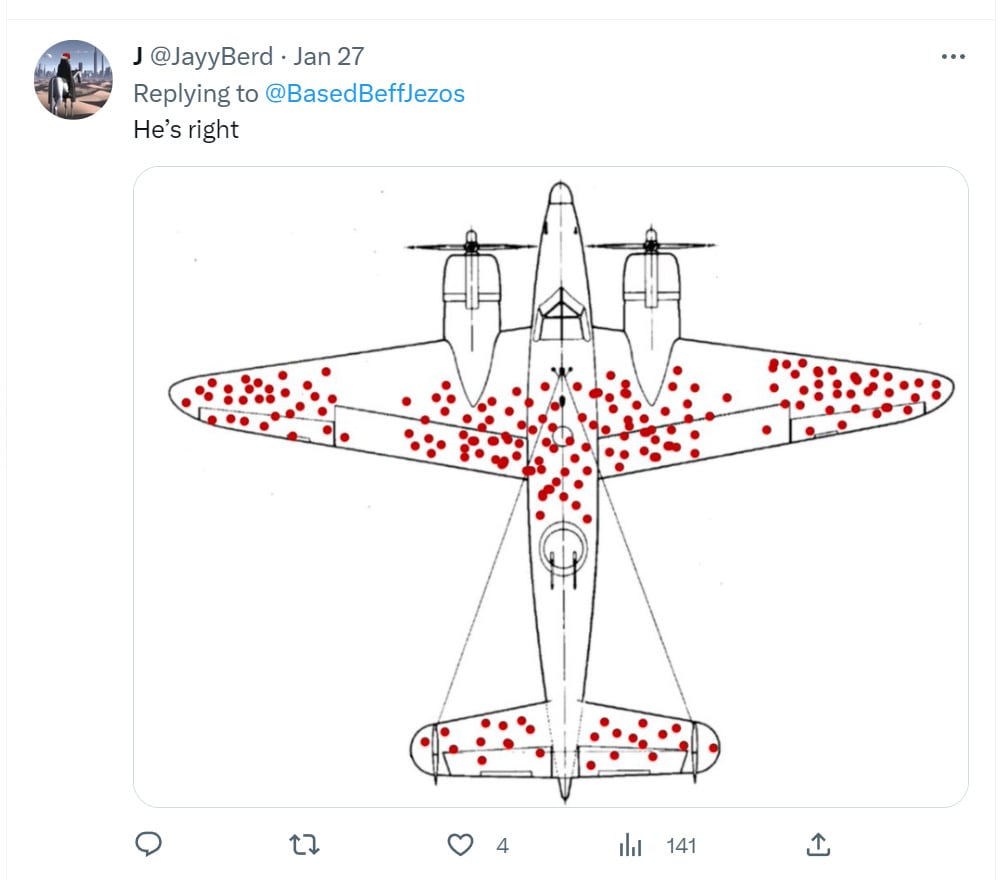
Fusion power is a great example of a real thing we want smart people working on. We then turn away any of them unwilling to accept insanely high life friction, and also saddle those people with insanely high life friction.
This does not seem like a good way to quickly get to fusion power.
It could still work in the end, but imagine how much better it would work to let only people with very high motivation levels participate. Or even those who want to work on fusion slightly more than finance to be able to do that without all the tsouris.
12 comments
Comments sorted by top scores.
comment by localdeity · 2023-05-03T14:04:04.317Z · LW(p) · GW(p)
According to the link, it's more like PornHub blocks Utah.
comment by gjm · 2023-05-03T21:04:44.627Z · LW(p) · GW(p)
When you write "So-and so writes such-and-such in Slate", wouldn't it make more sense for the link to be to the Slate article rather than to someone's tweet about the Slate article? More generally, I don't quite understand what seems like a firm commitment to having every possible external link going to a tweet. A large fraction of the tweets are just links. To my perhaps-jaundiced eye it doesn't seem like the Twitter discussion is generally so insightful or delightful as to make it better to link to that rather than to the actual information. Is there some sort of sponsorship deal at work or something?
comment by localdeity · 2023-05-03T14:27:10.391Z · LW(p) · GW(p)
The obvious intervention is that we can maximize how much people are allowed to lose, as a percentage of their wealth or income.
Probably "maximize" should be "put a maximum limit on" or similar.
comment by localdeity · 2023-05-03T13:54:28.119Z · LW(p) · GW(p)
I imagine how many customers you would love in the USA with such tactics
Probably "lose" rather than "love".
comment by gjm · 2023-05-03T21:09:27.492Z · LW(p) · GW(p)
I assume "anti-hideous" here
The weirdest one is architecture where (almost) everyone agrees the new normal is boring and hideous and anti-hideous
is an error but I can't add "... and was meant to be X" because I've no idea what X might have been. Probably some other anti-Y but with Y being something positive?
comment by Unnamed · 2023-05-03T19:51:11.142Z · LW(p) · GW(p)
It seems there is a thing called ‘exercise non-responders’ who have very low returns to exercise, both in terms of burning off calories and in terms of building muscle.
The research I've seen on exercise non-responders has been pretty preliminary. A standard study gives a bunch of people an exercise routine, and measures some fitness-related variable before and after. The amount of improvement on that fitness-related variable has some distribution, obviously, because there are various sources of noise, context, individuals differences between people. You can look at the left tail of that distribution - the people who had little or no or negative improvement on this fitness measurement over the course of the study - and say that they were "non-responders" to this exercise intervention.
One hypothesis for why that happened is that there is some stable & general individual difference, something about their physiology, which makes it so that they wouldn't respond much to pretty much any exercise routine that they tried.
In order to see if that's what's going on, rather than the various other things which could cause this measure of a person's fitness to fluctuate, or attempts at this exercise routine to have more or less of an effect, you'd have to do some more research to understand what's going on with these people in more detail. But for the most part that additional research doesn't get done, people just talk about the people whose fitness measurement didn't change much from this intervention as if being a non-responder or a low-responder is a stable trait of theirs. That's the case with the first study cited in this twitter discussion.
In the replies to that tweet, someone links to one paper which did continue to study the non-responders to an exercise intervention, just trying more dakka (more training sessions per week), and found that every person ended up with some improvement.
comment by Dagon · 2023-05-03T16:00:49.131Z · LW(p) · GW(p)
I'm shocked that the roulette article doesn't prominently mention previous reports of prediction in the game. https://en.wikipedia.org/wiki/The_Eudaemonic_Pie was published in 1985, and described pocket computers with toe-input and ankle-shock-output.
Like card counting in Blackjack, this has been known for a long long time, and since at least the '90s, the problem has been finding casinos that make it possible to actually make bets in a way that has a player edge. For blackjack, more decks, changed rules, and early shuffles killed the possibility in most places. For roulette, most places don't give very long after the ball is spun to get new bets down.
For the pay-per-article option, I don't hold out much hope that it'll be a reasonable discount over subscription. Likely about the same ratio as movie rental to subscription cost - maybe 3-5 articles costing the same as a month of sub. There are plenty of also-ran services I might be willing to spend on a very occasional article, but any of the big ones I want JUST enough that I'm not willing to buy the articles if I'm not willing to subscribe.
Replies from: AllAmericanBreakfast↑ comment by DirectedEvolution (AllAmericanBreakfast) · 2023-05-04T14:42:17.449Z · LW(p) · GW(p)
I expect you’re right about the per article price if an individual consumer is buying individual articles. My guess is we’ll see pan-journal subscription services that can negotiate better deals with their affiliates.
comment by Templarrr (templarrr) · 2023-05-06T15:50:35.228Z · LW(p) · GW(p)
The Age of Average
Seems like an error - either missing section or abandoned draft to what became later "Algorithms of Cultural Blandness"
comment by Templarrr (templarrr) · 2023-05-06T15:44:26.163Z · LW(p) · GW(p)
it’s impossible to compare interventions that alleviate extreme poverty to those that preserve rare cave fungi?
Honestly I don't think this one is as good an argument as a lot of EA folks thinks. Even in cases when it is possible to compare - EA approach to be "as cost effective as possible" drives it to "monoculture" approach. If one thing gives the biggest benefit for the $ spent - every other should be abandoned, because any $ spent on them is not spent on the most cost effective thing!
Monocultures have a lot of downsides too. Ask bananas.
Also funny to see this discussed right after the section about blandness and averaging out anything distinct.
comment by Chuck Newsom (chuck-newsom) · 2023-05-04T12:58:51.752Z · LW(p) · GW(p)
"... a rouge AI loose ..." was likely intended to be "... a rogue AI loose ..."